Before the census and civil registration, often the only documents to contain the names of our ancestors are parish registers. If your roots are in Great Britain it can sometimes be difficult to find church records for the area that you are interested in. So, this post is a look at this important genealogy record set; British parish registers. I’ll look at the history before getting into how you can find them.
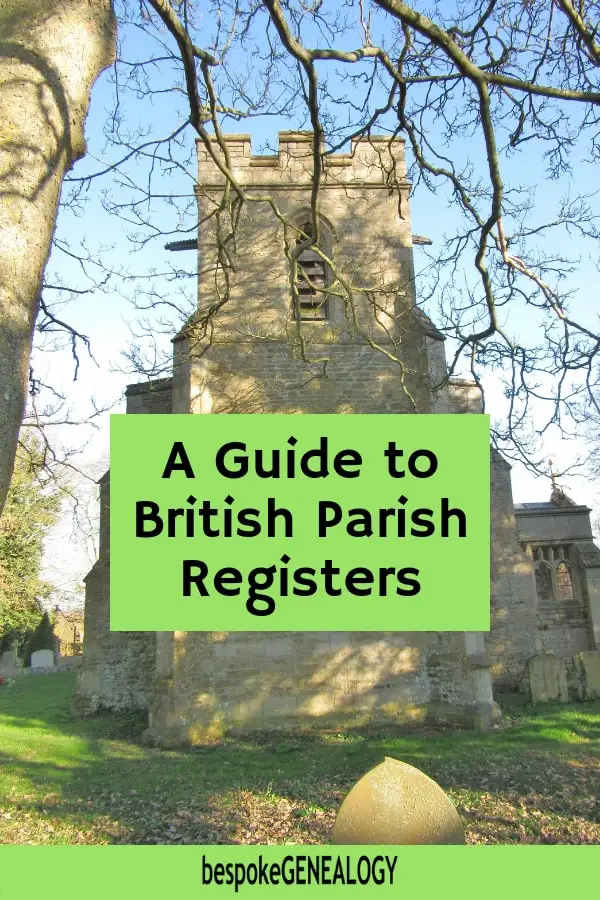
This post is looking at British parish registers; from England, Wales and Scotland. If you are looking for Irish registers, check out Using Free Irish Catholic Parish Records and How to Find Irish Parish Registers.
England & Wales
Parish churches have been required by law to keep registers of baptisms, marriages and burials since 1538. These were recorded in large ledgers and stored in locked chests. From 1598 copies of the registers had to be made for the previous year and sent to the local Bishop or Archdeacon and these records are known as Bishop’s Transcripts.
Usually there was a single register that recorded baptisms, marriages and burials. The information recorded was minimal and until the 1700s was usually written in Latin. From 1754, churches had to be licenced to perform marriages and had to keep a separate marriage register containing pre-printed pages. And from 1812, Baptisms and Burials were also recorded in separate pre-printed registers.
Note that all non-conformists apart from Quakers and Jews had to marry in an Anglican church until 1837. Non conformists were also often buried in parish churchyards if this was the only consecrated ground in the local area.
This is the information you should expect to find in parish registers:
Baptisms
Pre 1812
- Baptism date
- Christian name/s of child
- First and surname of father
- First name of mother
Sometimes the vicar will record extra information such as date of birth and mother’s maiden surname.
Post 1812
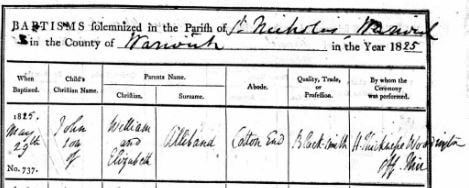
1825 Baptism
- Baptism date
- Christian name/s of child
- First and surname of father
- First name of mother
- Occupation of father
- Abode
The Abode was usually just the name of the parish where the family lived, but sometimes the name of the street or an area of a town is recorded. Some baptism registers also record the date of birth.
Marriages
Pre 1754
- Marriage date
- Christian name and surname of groom
- Christian name and surname of bride
Sometimes more information is recorded such as which parish both parties were from and the name/s of one or more of the parents.
1754-1837
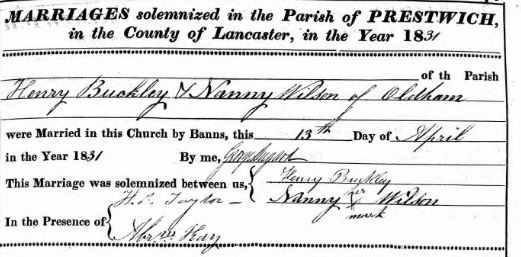
1831 Marriage
- Marriage date
- Christian name and surname of groom
- Christian name and surname of bride
- Signatures or marks of couple
- Names of witnesses
Post 1837

1842 Marriage
From 1837 the parish marriage register was in the same format and recorded the same information as the civil marriage certificate. Therefore, if you can find a parish marriage record online, it may save you the cost of ordering a certificate from the General Register Office.
- Marriage date
- Christian name and surname of groom
- Christian name and surname of bride
- Ages of couple (often just “Full Age” is recorded if they were over 21)
- Condition (bachelor, spinster, widow etc)
- Occupation of both parties (often only the groom’s occupation is recorded)
- Residence of both parties (often a street address, but sometimes just a name of a parish)
- Christian name and surname of the fathers of both parties
- Occupations of fathers
- Signatures or marks of couple
- Signatures or marks of witnesses
Burials
Pre 1812
- Burial date
- Name of deceased
Sometimes the name of the father is recorded if the deceased is a child.
Post 1812
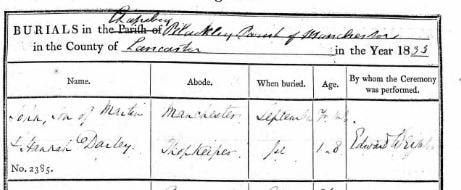
1833 Burial
- Name of deceased
- Abode (may be a street address, but is often just the name of the parish)
- Burial Date
- Age
Often the name of the father is given if the deceased is a child. Sometimes the name of the husband is recorded if thedeceased is a married woman.
Civil Registration
Civil registration in England and Wales began in 1837 and you can obtain copies of birth, marriage and death records from this date directly from GRO (General Register Office). See The Free BMD Index and British GRO Guide for more information about the GRO.
However, although the Church lost some of its administrative importance after 1837, it is worth remembering that baptisms, marriages and burials continued to be recorded in parish registers, so these records are still worth seeking out.
Where to find records
Although parish records have been kept since 1538 and copies made (Bishop’s Transcripts) since 1598, not all records survive. Many registers have been lost over the years, especially during the civil war and Interregnum (1642-1660). Some parish vicars were not as diligent as others and sometimes events were never recorded.
The majority of parish registers do survive and are usually now held in county archives. From the late 19th century genealogists and family history societies transcribed many registers and published the typed transcripts in bound volumes. Later, archives and other organisations like the Church of Latter Day Saints (LDS) photographed registers and made them available on microfilm/microfiche. More recently many of these films have been digitized and new scans of original registers have been made. Much of this is now available online via different sources.
The database sites Findmypast, The Genealogist, Ancestry (subscription) and Family Search (free) all have English and Welsh parish register collections. No one has a complete collection of all registers from all counties. Note that some registers will not be available on any of these sites. These sites have a mixture of transcriptions only and transcriptions with images of the registers.
See the English Parish Register Guide and Welsh Parish Register Guide on this website for a complete list of counties with links to the websites of the county archives and the local family history societies. Also listed are links to the parish register record sets held by the database sites by county.
Some county archives, such as Essex, have scanned images of their parish records which can be accessed for a fee. Family history societies often have transcriptions of records which can be purchased on a disc or downloaded, again usually for a fee.
Other sites worth checking out are:
DustyDocs has an interactive map of Britain and Ireland where you can find your county and then drill down to a parish for links to any free records available. There are also lots of other useful links on this site so it’s well worth checking out.
FreeREG is a volunteer project with the aim of transcribing all church and non conformist records. It is fully searchable, but the work is far from complete. You will need to check individual parishes to see how much is available.
Parish Chest If the parish records you want to access are not available on any of the subscription sites, an alternative is to get hold of a transcription of the registers of a particular parish. These transcriptions were usually originally done by family history society volunteers (see above) and are available on disc. The sale of these discs raises useful money for the societies. Parish Chest is one of the retailers selling these discs online, along with other genealogy related products.
Genfair is similar to Parish Chest (above) and is run by the retail arm of The Genealogist and operates as a sort of marketplace for some of the family history societies (FHS).
If FHS transcriptions for a particular parish are available on disc, you should find them at either Parish Chest or Genfair.
Scotland
In Scotland, the earliest registers for the established Church date from 1553, but registers for most parishes start much later. The Scottish Government, through its archives, controls the distribution of parish registers north of the border through the Scotland’s People website. Therefore, apart from some transcriptions, you won’t find many of these records on the subscription sites.
Scotland’s People holds digitized copies of parish records for the whole of Scotland. These can be downloaded for a fee. Registers from the established Church of Scotland, the Roman Catholic Church as well as other non-conformist churches are available. A useful guide to church registers can be found on the site.
Indexes to Births and Baptisms, 1564-1950 and Marriages, 1561-1910 can be found for free on Family Search. Coverage is patchy and not complete. This site also holds Church Records and Kirk Session Records, 1658-1919. These are records of Church of Scotland synods, presbyteries and kirk sessions containing registers of baptisms, marriages, and burials. These were originally filmed at the National Archives of Scotland (CH2 series). All of these records are transcriptions.
Findmypast has the same baptism and marriage records as Family Search (above). In addition this site has the following collections of transcriptions:
- Scotland, Parish Births & Baptisms 1564-1929(non conformist church records transcribed from records held by the National Records of Scotland).
- Scotland Roman Catholic Parish Baptisms
- Scotland Roman Catholic Parish Burials
- Scotland Roman Catholic Parish Marriages
Ancestry also has the Family Search parish records transcriptions.
Civil registration stated in 1855 in Scotland and these records of births, marriages and deaths are also available on Scotland’s People.
For more information on Scotland’s People see Scottish Genealogy: Making the Most of Scotland’s People
Happy researching!
Please pin a pin to Pinterest:

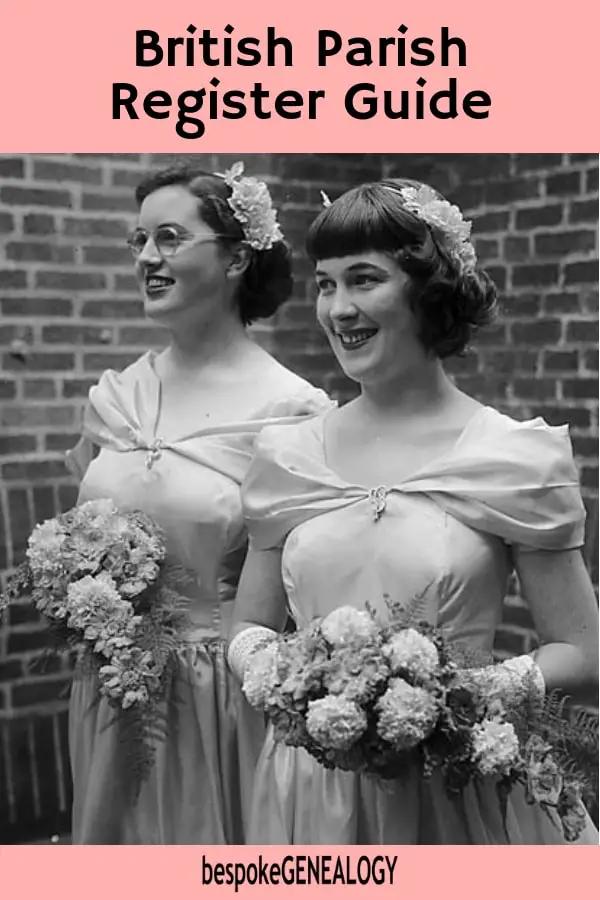
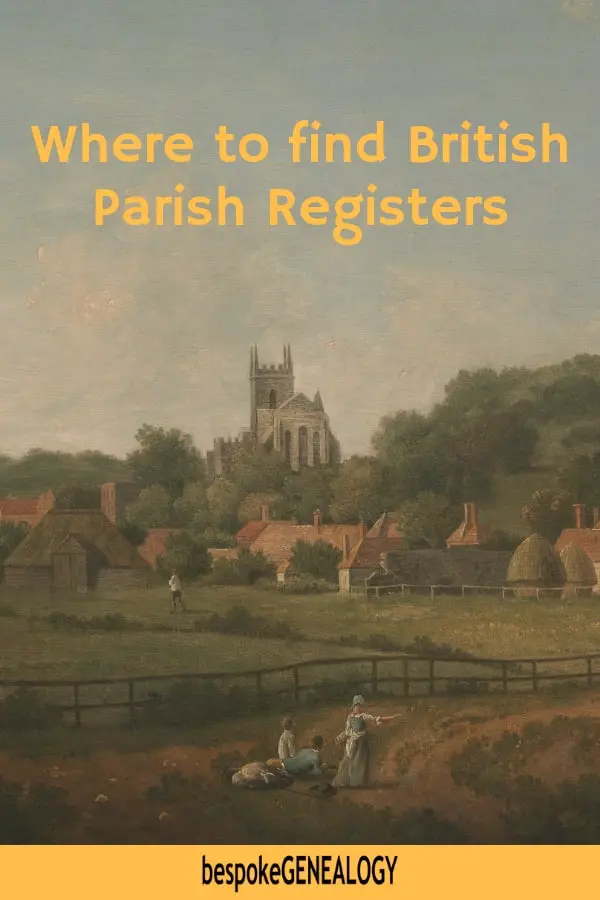
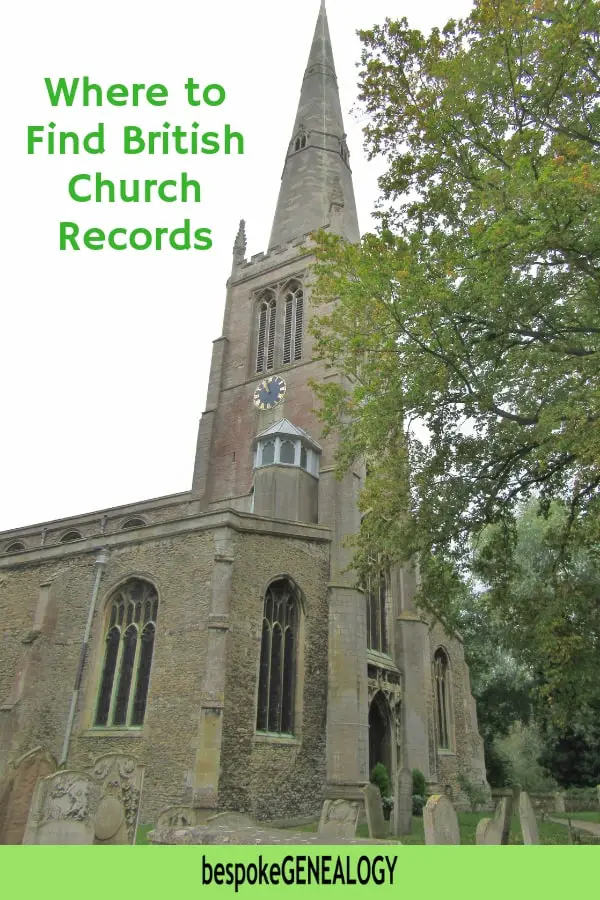
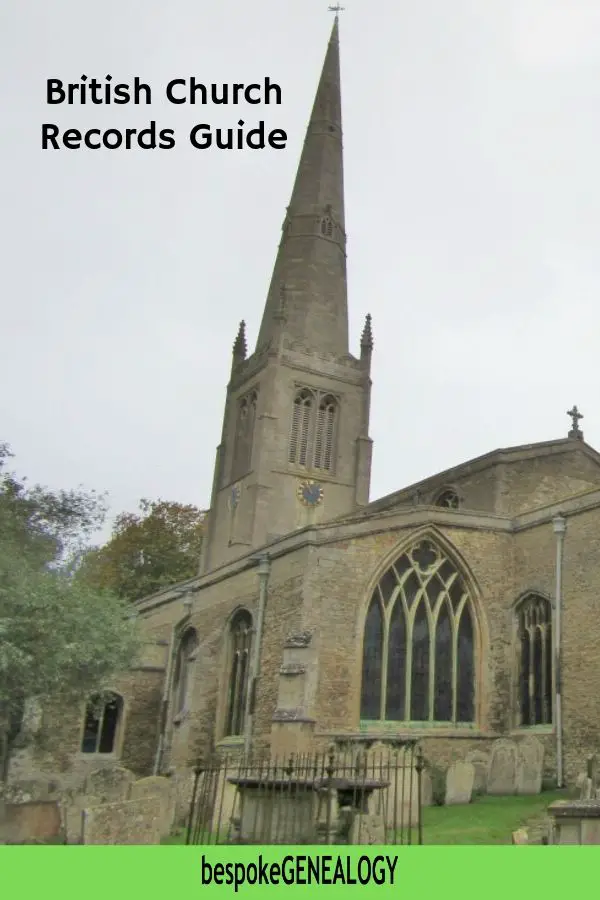
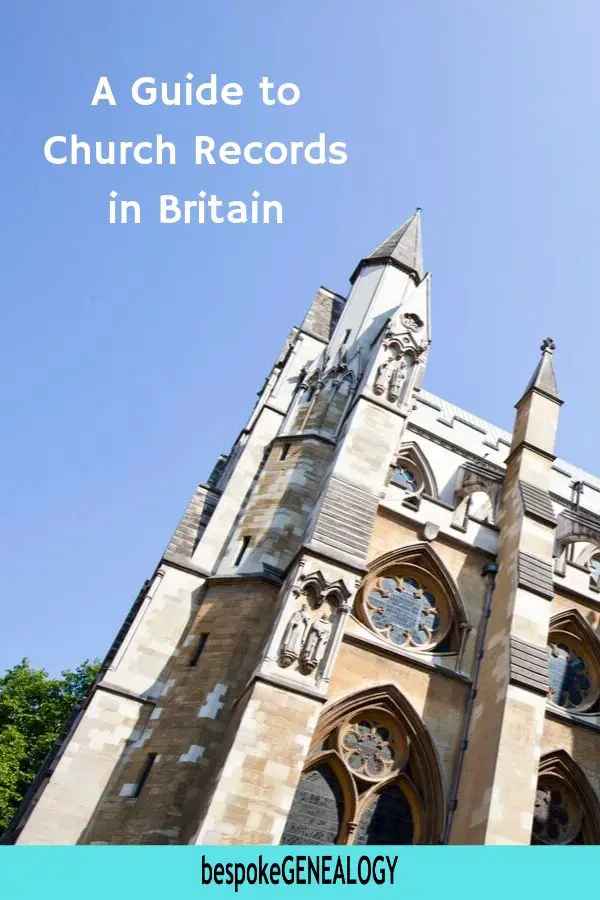
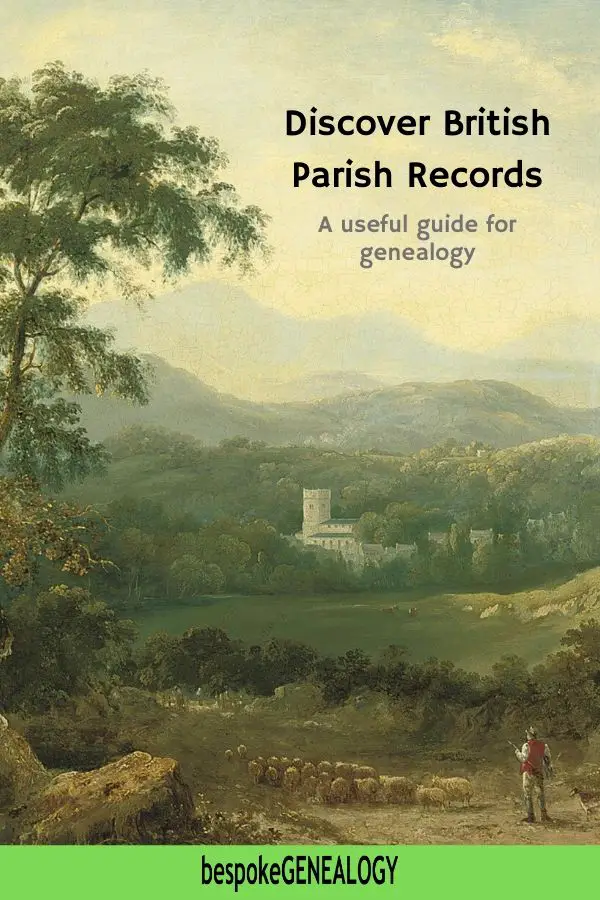
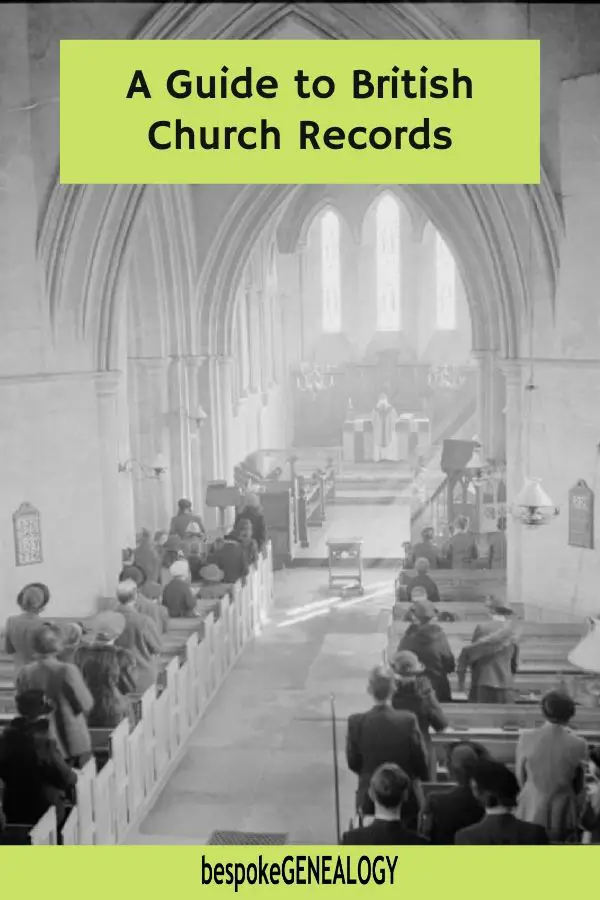
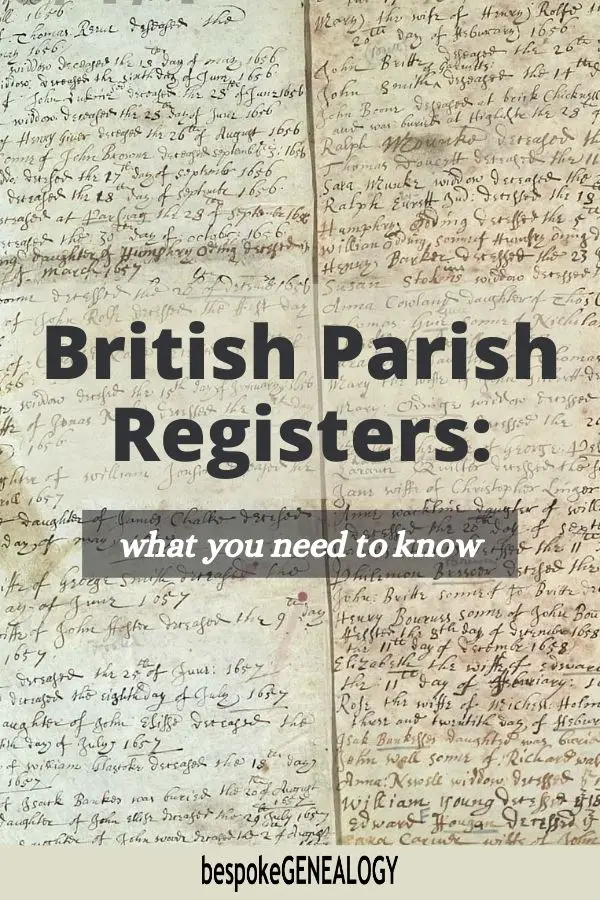
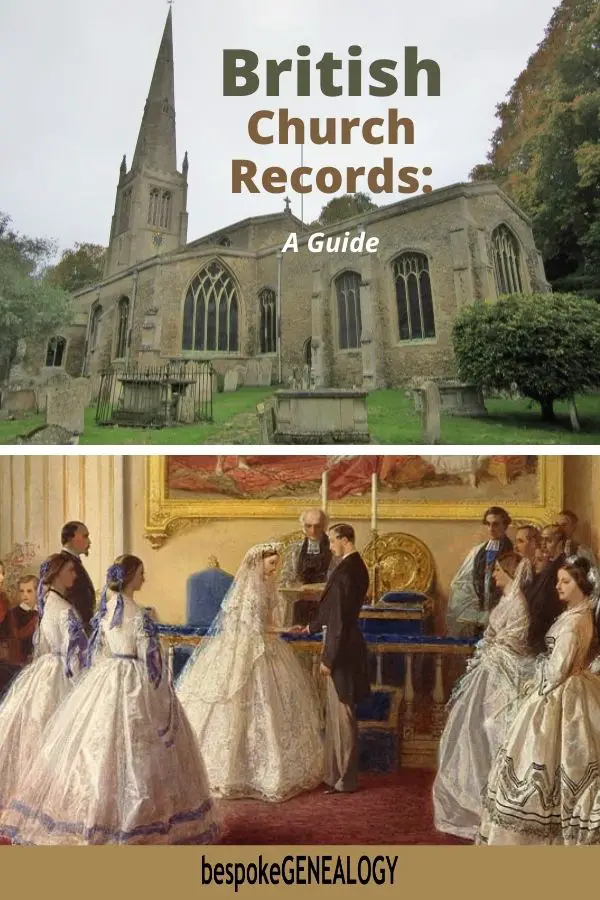
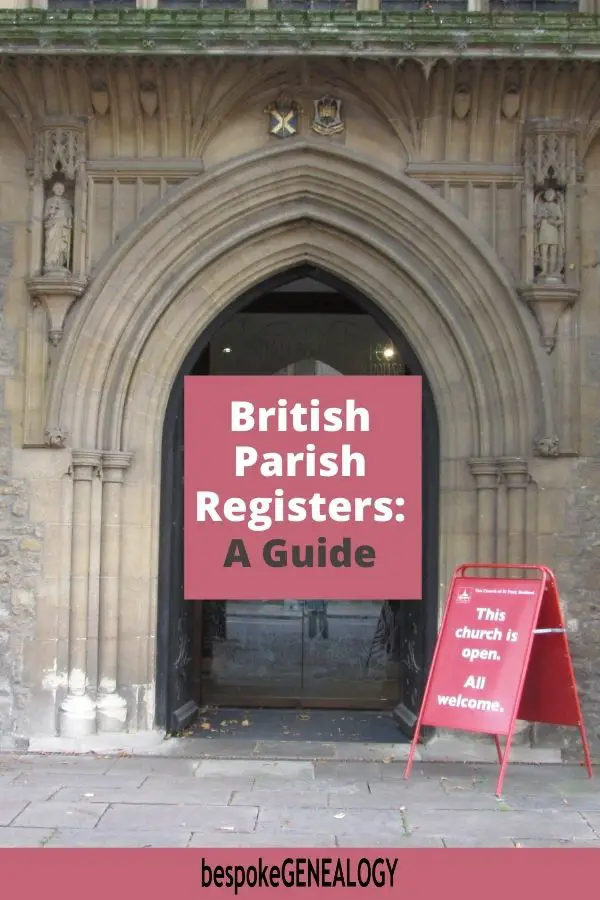
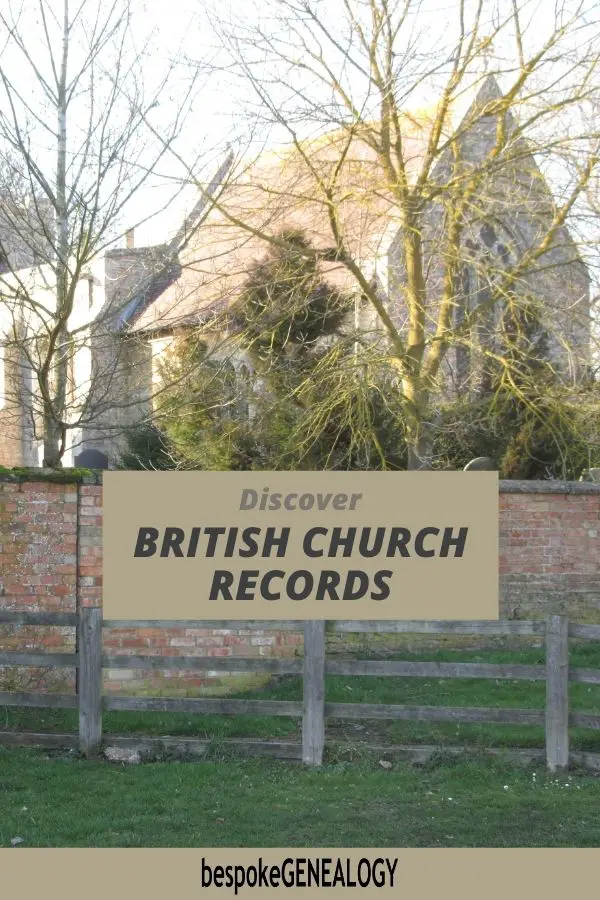
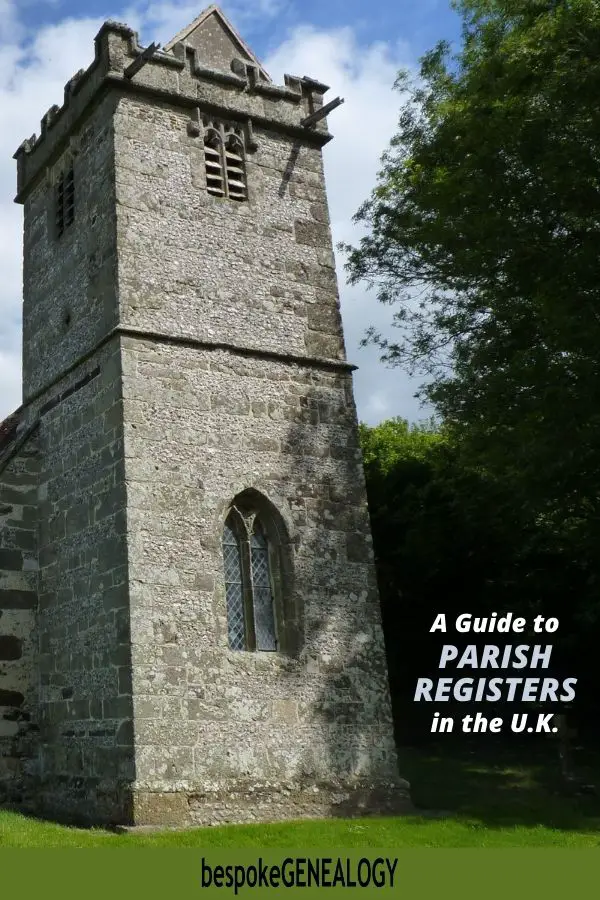
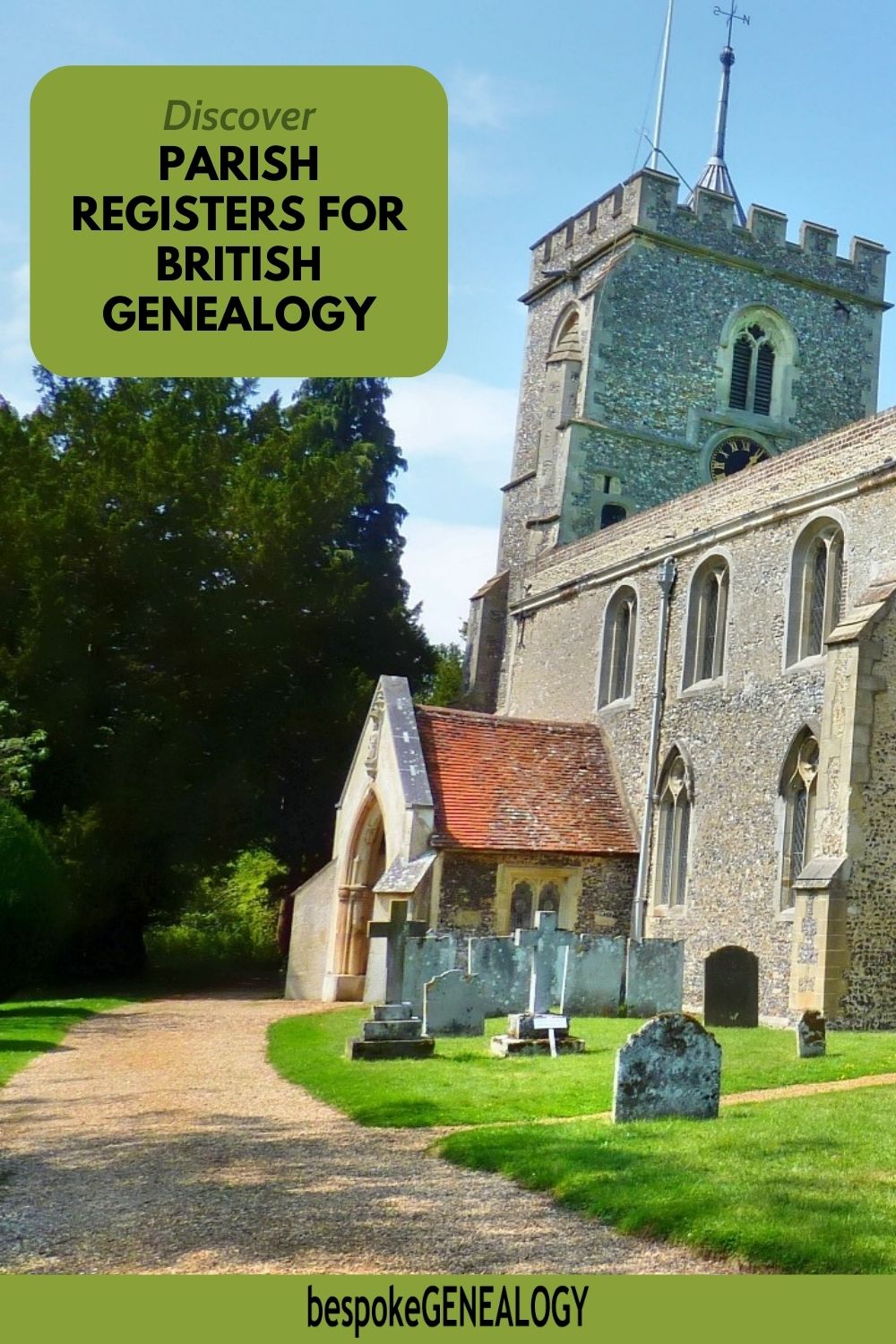

Thank you for your article ‘A Guide to British Parish Registers’. I found it useful and it answered my questions about the history of British vital records, Cheers, Marjie (from Australia)
You’re welcome Marjie. Good luck with your research!